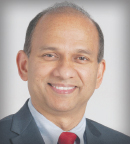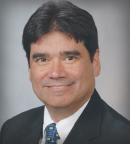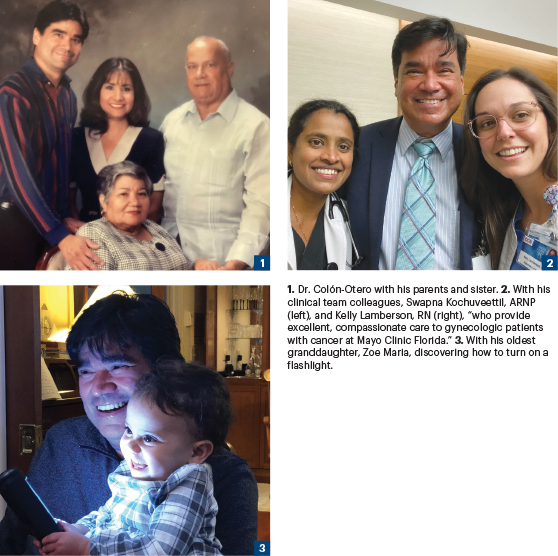In this installment of Living a Full Life, guest editor Jame Abraham, MD, spoke with Gerardo Colón-Otero, MD, Professor of Medicine at Mayo Clinic College of Medicine, Past Chair of the Division of Hematology/Oncology at the Mayo Clinic in Florida, and Vice Dean at Mayo Clinic Alix School of Medicine. Dr. Colón-Otero has served in multiple leadership roles at the Mayo Clinic, including member of the Board of Governors, Chair of the Strategic Planning Committee, Chair of the Diversity Committee, and Chair of the Quality Committee. He is past President of the Florida Society of Clinical Oncology and serves on the Board of Directors of Community Hospice Northeast in Jacksonville, Florida.
Gerardo Colón-Otero, MD, was born in Puerto Rico, where he was reared in humble circumstances. His mother encouraged him and his sister to pursue careers in medicine, no matter what challenges lay ahead.
“My mom was one of five kids in a low-income family, and my father was one of seven, the son of a small-farm farmer in the Eastern part of Puerto Rico,” said Dr. Colón-Otero. “Like his older brothers before him, when my father reached age 14 and was in the eighth grade, he quit school and left home to make a life for himself, as there wasn’t enough money to support everyone. Although my mom dreamed of becoming a teacher, being the oldest child, she had to help raise the other kids. After she married and had my sister and me, she practiced teaching on us, turning our home into a learning center, all the while encouraging us to pursue careers in medicine. And so, we owe our careers to her—my younger sister is a nurse, retired from the Veterans Affairs (VA) Hospital System.”
Asked about early influences on his academic career besides his mother, Dr. Colón-Otero said: “My ninth-grade industrial arts teacher saw that I had an aptitude for learning, and he introduced me to Jules Verne’s books. Before that, I hadn’t done any independent reading, just what was needed for my homework. I ended up reading all of Jules Verne’s books, which sparked a lifelong interest in reading and learning.”
GUEST EDITOR

Jame Abraham, MD, FACP
He continued: “When I was growing up, there was a college preparatory high school that was built specifically for children of the professors at the University of Puerto Rico. But the school would accept some students from the public schools based on a test, which I took and passed. I was exposed to incredible math and science teachers, the same teachers who were professors at the university. I took accelerated math courses that enabled me to enter the University of Puerto Rico, where I majored in math for 2 years. Following graduation, I was accepted to the University of Puerto Rico School of Medicine, where I attained my medical degree.”
Dr. Colón-Otero noted that when he entered the University of Puerto Rico School of Medicine, he was only 19 years old. “It’s a state medical school with incredible teachers that dedicate their lives to their students. Because they’re really not paid enough, they have to supplement their income with their own private medical practices. Back then, the tuition was only $2,000 a year, but I was able to get a full scholarship; my parents wouldn’t have been able to afford even that modest tuition.”
Gerardo Colón-Otero, MD

Gerardo Colón-Otero, MD
- On starting at the Mayo Clinic in Florida: “I was just 30 years old, and there were only 32 of us when we opened the doors in 1986. All of us were young and very eager to build something we could be proud of.”
- On disparities in cancer outcomes: “There may be some biologic contributors, and it is important to try to solve these disparities, because it’s sad to see members of our community in our wealthy country who are not able to get the high-value cancer care they need.”
- On advice for young oncologists: “First, you have to be humble and understand how much you depend on others—that you are not really the whole solution, only part of it.”
Destined for Mayo Clinic
In his second year of medical school, Dr. Colón-Otero offered a prescient observation during an introductory course on the physical exam. “I had to present a case of lupus to the chief resident; the patient was a young lady. I took her clinical history, after which I remember telling the chief resident that she should have an ANA [antinuclear antibody test], anti-dsDNA [anti–double stranded DNA], and complement test. He looked at me sort of perplexed and said: ‘Where do you think you are? At the Mayo Clinic?’ And to be honest, I had never heard of the Mayo Clinic before that interaction. So, I went to the library and found the Mayo Clinic Proceedings, and there was a page explaining how to apply for a visiting medical clerkship. I became very interested and applied for a hematology clerkship,” said Dr. Colón-Otero.
Prior to entering his hematology clerkship at the Mayo Clinic, Dr. Colón-Otero took the advice of a medical school friend—later to become his wife—who suggested he do a summer program subinternship at the local VA hospital. “I spent a summer doing an internal medicine program as a third-year medical student. It was a wonderful experience, during which I interacted with patients with myeloma and other cancers. I actually did my first sternal bone marrow aspirate with a resident supervising me. It was probably the only sternal bone marrow I’ll ever do because we don’t do them anymore,” said Dr. Colón-Otero.
Husband and Wife Physicians
After Dr. Colón-Otero’s learning experience at the VA, during which he read the landmark textbook Williams Hematology cover-to-cover, he left for the Mayo Clinic in Rochester, Minnesota, to begin his visiting medical student clerkship in hematology. There he would meet three doctors who affected his career trajectory. “The first physician I met at the Mayo Clinic was Dr. Robert Kyle, who was the attending on the hematology hospital service. He is an incredibly kind and humble person, even though he’s a multiple myeloma guru. The second person was Dr. Jerry Holcomb, who was a thrombosis doctor, a wonderful, kind person. And the third was Dr. Murray Silverstein, who was Chair of Hematology—an incredibly charismatic individual and the first doctor I ever saw sit at patients’ bedsides, hold their hands, and make them laugh, even though they were dying of acute leukemia. These doctors were incredible role models for me from the beginning. I was hooked and did my internship, residency, and hematology fellowship at the Mayo Clinic,” said Dr. Colón-Otero.

During his internship, Dr. Colón-Otero married his fiancée and wife for 41 years, Dr. Nelly Mauras, who was in her third year at the University of Puerto Rico Medical School. “The medical school administration was kind enough to let my wife do most of her fourth year of medical school at the Mayo Clinic. But since she followed me from Puerto Rico to the cold north of Minnesota, it was then my turn to follow her to the University of Virginia (UVA) after she completed a pediatrics residency at Mayo, where she did a pediatric endocrinology fellowship with Dr. Bob Blizzard. I was fortunate enough to be accepted at UVA for an oncology clinical and research fellowship under the mentorship of Dr. Peter Quesenberry, an amazing physician scientist, so it really worked out for both of us,” said Dr. Colón-Otero.
Opportunity Knocks
At the time that his wife completed her pediatric residency, Dr. Colón-Otero received news that the Mayo Clinic was planning to open a facility in Jacksonville, Florida. “I was approached with an opportunity to join the new Mayo Clinic in Florida, serving as the institution’s first and only hem/onc physician, which was a unique opportunity to build a program from the ground floor up. My wife was on board with it, so I accepted the offer. I was just 30 years old, and there were only 32 of us when we opened the doors in 1986. All of us were young and very eager to build something we could be proud of,” he said.
Dr. Colón-Otero and his wife returned to the Mayo Clinic in Minnesota for a few months prior to beginning his new position in Jacksonville. “Our first child was born while we were in Minnesota, and when we left for Florida, we were a bit concerned, as my wife didn’t have a job lined up. However, it was around that time that Nemours Children’s Health was developing a pediatrics subspecialty practice in Jacksonville, and they approached my wife to be their first pediatric endocrinologist. So her career has followed a path similar to mine in terms of developing something from the ground up. My wife is still there, and they now have eight full-time physicians and scientists in pediatric endocrinology and a fellowship program she developed. She’s had a fantastic medical career with Nemours,” said Dr. Colón-Otero.
A Fulfilling Journey
Since 1986, when Dr. Colón-Otero began his career at the Mayo Clinic in Jacksonville, the program has grown from the original 32 clinicians to more than 700 full-time physicians and scientists, plus more than 300 medical students, residents, and fellows. “It’s been an incredible experience being part of this institution’s formation and growth, during which I’ve served as Chair of Hematology/Oncology and on the Board of Directors. I started the fellowship program in hematology/oncology and was also involved in the internal medicine residency program development. Since the beginning, I’ve been developing the rotations for the Mayo medical students in Jacksonville. And I’m sort of in charge of the same Visiting Medical Clerkship in Florida that played such a huge role in my career as well,” said Dr. Colón-Otero.
Wearing Multiple Hats
Asked about his current activities, Dr. Colón--Otero responded: “I’m in charge of the Florida campus for the Mayo Clinic Alix School of Medicine. We have a program whereby 12 students spend their last 2 years here with us after their first 2 years in either Arizona or Minnesota. They are accepted by a Florida admissions committee that I chair. My clinical research is focused on the treatment of breast cancer and gynecologic malignancies, as well as on efforts to eliminate cancer care outcome disparities.”
In collaboration with community entities, Dr. Colón-Otero’s team develops community-based interventions aimed at ensuring underserved populations have adequate access to cancer screening and cancer research programs. “As we know, there are significant disparities in cancer outcomes,” he said. “Many are due to the social determinants of health, or how our health system works based on access to care, and so forth. But there may be some biologic contributors, and it is important to try to solve these disparities, because it’s sad to see members of our community in our wealthy country who are not able to get the high-value cancer care they need. Coming from a low-income family in Puerto Rico, the disparities issue hits home for me.”
Words of Wisdom
Asked to share some hard-won advice for young oncologists in residency or fellowship, Dr. Colón--Otero said: “First, you have to be humble and understand how much you depend on others—that you are not really the whole solution, only part of it. My internship was a tough time, making the transition from Puerto Rico to the Mayo Clinic, and thanks to the kindness of my mentors like Dr. John G. Mayne, colleagues, and my wife, I made it. I wouldn’t be here if it wasn’t for the nurses who helped me when I was an intern trying to make critical clinical decisions.”
He continued: “As we get older, we become patients ourselves. Right? Then we really witness firsthand the incredible kindness and dedication it takes to be part of this great field of medicine.”
How does a super-busy academic oncologist decompress? “That’s easy: family,” said Dr. Colón-Otero. “Family takes all my time. My wife and I have dinner. We play cards sometimes. I read some and try to spend time with the grandkids as well, who are the source of great joy.”
DISCLOSURE: Dr. Colón-Otero reported no conflicts of interest.

